Al Habtoor's Influence on Dubai's Real Estate Landscape


Intro
The Dubai real estate market is often seen as a vibrant and continually evolving landscape, with many key players contributing to its success. Among these prominent figures, the Al Habtoor Group stands out, carving its niche by blending luxury residential offerings and innovative mixed-use developments. This exploration of Al Habtoor Group’s impact on the Dubai property sector offers insights into its historical foundations, iconic projects, and how its strategic visions align with the ever-changing market dynamics.
Al Habtoor's influence spans various segments, from lavish hotels to high-end residential communities, each embodying architectural brilliance and sophistication. Stakeholders, whether investors, homebuyers, or agents, will benefit from understanding how Al Habtoor's ventures shape property values and accessibility in the region.
As Dubai continues to attract global attention and investment, the role of established players like Al Habtoor becomes integral to defining the market's direction. This piece aims to provide clarity on current trends, future prospects, and essential strategies for navigating this competitive environment.
Prologue to Al Habtoor Group
The Al Habtoor Group embodies a significant pillar in the Dubai real estate market, with a rich history and a foundational ethos that has guided its extensive portfolio of projects. To fully appreciate Al Habtoor's impact and contributions, it’s crucial to explore the company's historical background and its underlying principles. Understanding this group's journey not only illuminates its achievements but also offers insights into its strategic decisions which have shaped the urban landscape of Dubai.
Historical Background
Founded by Khalaf Ahmad Al Habtoor in 1970, the Al Habtoor Group began as a small contracting firm operating in the United Arab Emirates. Initially involved in the construction sector, the company gradually diversified its operations, delving into real estate, hospitality, and automotive industries. Over the decades, this expansion reflects the broader economic boom Dubai has experienced, driven largely by visionary leadership and a keenness to seize emerging opportunities.
A notable milestone occurred in the 1990s when Al Habtoor Group commenced its foray into real estate development. The completion of the iconic Al Habtoor City, which features luxurious residences, three hotels, and the region’s largest water-themed park, is a testament to both ambitious planning and execution. The company has not only contributed to the skylines of Dubai but also set benchmarks for quality and innovation in construction. Over time, the group has successfully erected structures that symbolize luxury and comfort, harnessing the unique characteristics of Dubai’s multicultural fabric.
"A city’s identity is often molded by the advancements of its architectural marvels; in this context, Al Habtoor Group plays an indelible role in molding Dubai's profile."
Foundational Principles
At the heart of Al Habtoor's enduring success lies a set of principles that govern its operations. These principles include a commitment to excellence, innovation, and community engagement. The company believes in not merely constructing properties but also in creating spaces that enhance lifestyles and foster communities. This approach resonates with the increasing demand for holistic living environments in the urban context.
- Excellence in Quality: Al Habtoor Group diligently inspects every facet of construction, ensuring that both materials and workmanship meet the highest industry standards. This commitment to quality not only enhances customer satisfaction but also ensures long-term value for investors.
- Innovation: The company embraces cutting-edge technologies and sustainable practices in its developments. This focus on innovation allows for modern, efficient constructions that are sensitive to the environment.
- Community Engagement: Al Habtoor Group values corporate social responsibility, playing an active role in local community initiatives. From educational programs to cultural sponsorships, the group invests in forging connections that go beyond mere business transactions.
In summary, the Al Habtoor Group stands as a testament to Dubai's advancement in the real estate arena, with its historical context and foundational values acting as key drivers for its ongoing influence and success. The subsequent sections will delve deeper into how these principles manifest in the group's significant projects and its overarching impact on Dubai's dynamic property market.
Key Developments in Dubai
The Dubai real estate market has always been a churning sea of opportunities, some big waves caused by the likes of Al Habtoor Group. When discussing key developments, it's essential to grasp not only the skyscrapers that punctuate the skyline but also the seismic shifts in market dynamics ushered in by innovative projects. These developments are critical because they tend to spark greater economic activity, attract foreign investments, and cater to the evolving needs of both investors and homebuyers.
Throughout the years, Al Habtoor has embarked on creating properties that resonate deeply with the essence of luxury and practicality. The emphasis on creating lifestyle-oriented communities rather than standalone buildings signifies a noteworthy shift. This approach means more than just adding square footage; it's about curating spaces where people can build lives, fostering a sense of belonging—and that truly changes the game.
Signature Projects Overview
Al Habtoor’s signature projects are more than just structures; they serve as testaments to architectural prowess and community-centric design. Each project has its own story, etched into the fabric of Dubai's modern history.
For instance, the Habtoor Palace Hotel stands as a jewel in the heart of the city, blending opulence with traditional Arab hospitality. In 2017, the establishment not only transformed the hospitality landscape but also brought forth a plethora of jobs, bolstering the local economy.
Moreover, developments such as the Al Habtoor City, comprising luxury residences, hotels, and leisure facilities, exemplify a holistic view of urban living. It facilitates a lifestyle that’s close to chic restaurants and vibrant entertainment options, offering both residents and visitors a taste of the rich tapestry that Dubai weaves.
"Investing in properties developed by Al Habtoor isn't merely a transaction; it's an entry ticket into an evolving lifestyle set in a dynamic environment."
There’s also the Habtoor Grand Resort situated by the breathtaking shores of Jumeirah. This enticing blend of relaxation, luxury, and entertainment empowers it to draw both tourists and locals alike. It’s these types of projects that don’t just shape the physical landscape, but also influence socio-economic interactions.
Innovations in Real Estate Development
In a market as competitive as Dubai’s, innovation is the name of the game, and Al Habtoor is playing for keeps. The group emphasizes incorporating modern technologies and sustainable practices, ensuring that its developments are not just visually arresting but also environmentally friendly.
One noteworthy innovation is the use of smart technology within residential units. Homes equipped with such technologies enhance energy efficiency and provide increased comfort for the residents. Al Habtoor’s responsiveness to adapt to contemporary needs demonstrates a forward-thinking mindset, essential for attracting the new breed of investors focused on sustainability.
Furthermore, the attention to eco-friendly materials used in construction isn’t merely a trend; it reflects a commitment to building green. Such measures ensure that while Dubai's architectural marvels rise, they don’t come at the expense of the environment. There’s an undeniable recognition that sustainable practices can coexist with luxury living.
In essence, the innovations spearheaded by Al Habtoor Group redefine what it means to develop real estate in Dubai. They’re not just laying bricks and mortar but are crafting the future landscape of the emirate and beyond. The approach they take sets a benchmark for others in the field, presenting an exciting transition from traditional methods to a more integrated and intelligent way of building homes and communities.
Al Habtoor's Impact on the Market
The influence of Al Habtoor Group on the Dubai real estate market is not only notable but also transformative. The group's foray into real estate began long before many others recognized Dubai's potential as a global hotspot. By focusing on luxury developments and innovative projects, Al Habtoor carved out a significant niche that has repercussions for both investor confidence and the local economy.
Understanding this impact requires delving into specific elements such as market positioning, trends, and the group's broader role in economic development.
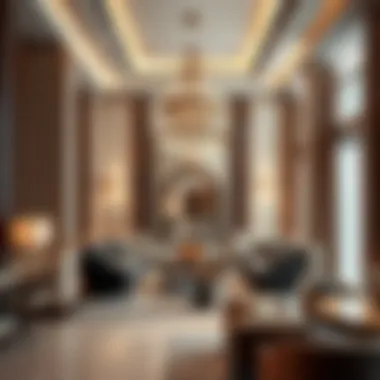
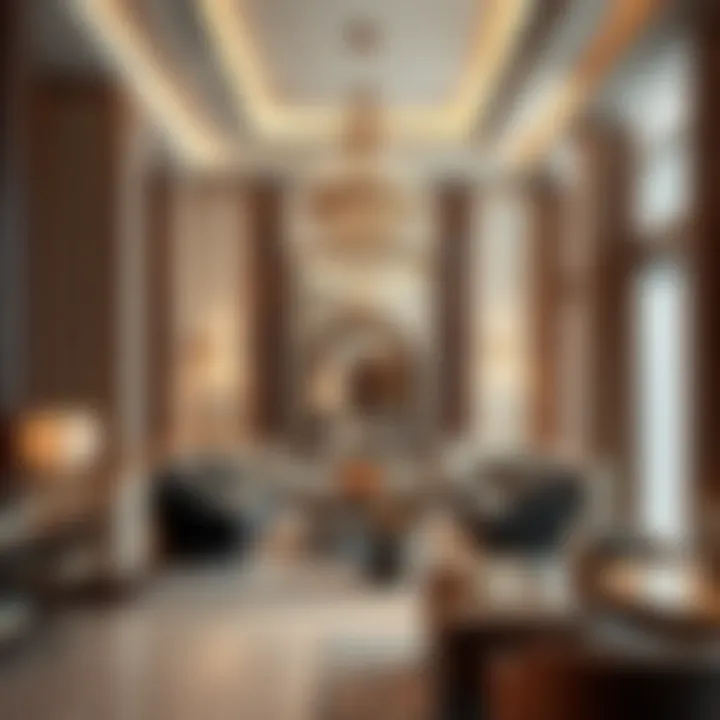
Market Positioning and Trends
Al Habtoor's strategy in positioning itself within the real estate landscape of Dubai reflects deep market insights. The group primarily targets high-end clientele, creating an array of exclusive properties that appeal to affluent buyers. Their luxury offerings—like the Al Habtoor City, featuring hotels, residential apartments, and leisure facilities—illustrate a well-orchestrated approach that attracts both residents and tourists.
Key Positioning Strategies:
- Luxury Focus: Al Habtoor emphasizes high-quality standards in design and amenities, appealing directly to upscale markets.
- Diverse Portfolio: By creating a mix of residential, commercial, and hospitality projects, they stabilize their revenue, even when one sector faces challenges.
- Brand Prestige: The name Al Habtoor carries weight. This reputation helps maintain property values and attracts investors looking for a safe haven.
Al Habtoor's developments often set the pace for market trends. For instance, the integration of smart home features in properties is a trend they champion, appealing to tech-savvy buyers looking for cutting-edge amenities.
"The future of real estate in Dubai is not just about building structures but creating integrated living experiences that resonate with luxury and innovation."
Role in Economic Development
Al Habtoor's impact extends beyond real estate; the group significantly contributes to the economic growth of Dubai. Their projects stimulate various sectors, from construction to tourism, which in turn create jobs, foster entrepreneurship, and enhance the overall quality of life in the region.
Economic Contributions:
- Job Creation: Each project brings various employment opportunities, both during construction and in operational phases.
- Tourism Boost: Developments such as luxury hotels and entertainment venues attract millions of visitors, underscoring Dubai's position as a top travel destination.
- Infrastructure Development: As part of larger projects, Al Habtoor often invests in surrounding infrastructure, improving accessibility and connectivity in the area.
In summary, Al Habtoor Group plays a crucial role in shaping the Dubai real estate market. Their strategic positioning not only enhances their brand but also significantly contributes to economic development, showcasing both the challenges and opportunities in this dynamic market.
Architectural and Aesthetic Contributions
The architectural and aesthetic contributions of Al Habtoor Group stand as cornerstones in the evolution of Dubai’s skyline and real estate landscape. As the city has burgeoned from a modest trading post into a global hub of commerce and tourism, the designs created by Al Habtoor reflect both the cultural heritage and the modern ambitions of its society. This section delves into the intricacies of their design philosophy and the notable architectural styles that characterize their projects.
Design Philosophy
Al Habtoor Group adopts a design philosophy that transcends mere function; it marries form with a sense of purpose and local identity. The emphasis here is on creating spaces that not only serve immediate needs but also resonate with the lifestyle of the people. Their architecture tends to draw inspiration from the surrounding environment and regional aesthetics, reflecting a profound respect for local tradition.
- Integration of Space: A hallmark of their approach is the seamless integration of indoor and outdoor spaces. This is particularly prominent in residential projects where open layouts and natural lighting are prioritized.
- Cultural Elements: They often infuse local motifs and materials that echo the Emirati culture. For instance, the use of mashrabiya—ornamental wooden lattice screens—brings both beauty and functionality, creating shaded areas while allowing airflow.
- Sustainability: Modern designs by Al Habtoor also prioritize sustainability. This includes the application of green building practices and energy-efficient systems, marrying aesthetics with environmental consciousness.
Such thoughtful design philosophy enriches the Dubai real estate market significantly, as it enhances the living experience and promotes a unique sense of community.
Notable Architectural Styles
The architectural styles manifested in Al Habtoor Group's developments are diverse, often capturing the essence of contemporary design while incorporating traditional elements. Their projects serve not only as residential or commercial spaces but also as landmarks that people identify with.
- Modern Glitz: In many luxury developments, there’s a penchant for modern glitz, characterized by sleek lines, vast glass facades, and opulent finishes. Structures like the Al Habtoor City complex exemplify this, combining state-of-the-art construction techniques with lavish interiors.
- Classical Arabic Architecture: Some projects, particularly those aimed at a culturally inclined audience, embrace classical Arabic architecture with domes, arches, and intricate tile work. These designs evoke a timeless elegance and are often seen in resort-style properties.
- Contemporary Minimalism: There’s also a growing trend toward minimalism in their designs. This simplicity in form and function reflects a lifestyle choice, appealing to buyers who prioritize ease and elegance over ornate details.
Finale
In summation, Al Habtoor’s architectural and aesthetic contributions to the Dubai real estate market are marked by a thoughtful blend of tradition and innovation. Their design philosophy not only enhances the physical landscape but also shapes community lifestyles, drawing in buyers and investors alike. As the demand for unique, culturally resonant architecture continues to grow, Al Habtoor Group remains at the forefront, pushing the boundaries of what real estate can represent in a city as dynamic as Dubai.
Strategic Partnerships and Collaborations
Strategic partnerships and collaborations can often make or break the success of any major player in the real estate sector. For Al Habtoor Group, these collaborations have fostered innovation, expanded operational capabilities, and enhanced market reach. In a landscape where competition has become fierce, aligning with the right partners has enabled Al Habtoor to leverage resources and expertise that are necessary for driving growth in Dubai's dynamic real estate market.
The impact of these partnerships shouldn’t be underestimated; they open the doors to new ventures and provide a unique competitive advantage. For investors, this means that developments by Al Habtoor are often more robust, well-conceived, and reflective of market needs. Whether it’s through joint ventures with architectural firms or alliances with technology providers, every collaboration serves to enrich Al Habtoor's offerings.
Local and International Collaborations
Engaging in both local and international collaborations has been pivotal to Al Habtoor's strategy. Domestically, the group has worked closely with various stakeholders including the Dubai government, real estate agencies, and cultural organizations. This local network helps ensure that developments are in sync with urban planning initiatives and community needs.
Meanwhile, on the global stage, Al Habtoor has sought partnerships with renowned companies that bring in best practices from around the world. For instance, teaming up with global construction firms or luxury brands can significantly elevate a project’s status, appealing to high-end buyers and investors. The fusion of local insights with international expertise creates a multiplicity of benefits that solidify Al Habtoor's standing in the market.
"Partnerships are not just about sharing resources; they’re about creating synergies that push boundaries and redefine markets."
Synergies with Government Initiatives
The relationship between Al Habtoor and governmental bodies is crucial for seamless development. In Dubai, where real estate is intricately linked to economic growth, having aligned objectives with government initiatives creates a win-win scenario. Al Habtoor works alongside the government on initiatives such as urban sustainability and tourism expansion, which are essential for the overarching economic framework.
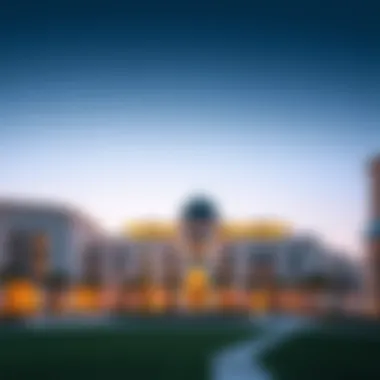

By backing government-led projects, Al Habtoor positions itself as a responsible corporate citizen. These alignments not only facilitate smoother regulatory processes but also ensure that the group's developments contribute positively to the local economy and environment.
Sustainability Initiatives
Sustainability is not just a buzzword nowadays; it has become a necessity in any sector, especially in real estate. The Al Habtoor Group understands this well and embodies sustainability in its practices, a crucial aspect that can significantly influence investor and buyer confidence. The integration of sustainable practices enhances project viability, creates healthier living spaces, and contributes to preserving the environment for future generations. In Dubai, a city that is rapidly growing, Al Habtoor's commitment to sustainability plays a pivotal role in promoting responsible growth.
Environmental Considerations
In the realm of environmental stewardship, the Al Habtoor Group has instituted various strategic measures aimed at minimizing ecological impact. One of the foremost considerations is water conservation. Projects often include state-of-the-art water recycling systems, drastically reducing the consumption of freshwater for irrigation and other uses.
Another vital aspect is energy efficiency. Incorporating solar panels and energy-efficient lighting into their developments has become commonplace. It's no longer just about aesthetics; these elements are crucial for reducing the overall carbon footprint of a building.
Key environmental considerations include:
- Water management systems: Special attention is paid to rainwater harvesting and greywater reuse.
- Energy-efficient building designs: Implementation of LEED certifications ensures high energy performance standards.
- Biodiversity: Preservation of local flora and fauna within urban environments.
"A sustainable approach not only helps the environment but enhances the desirability of properties."
Sustainable Development Practices
Sustainable development practices go beyond just installing eco-friendly systems. Al Habtoor emphasizes a holistic approach by considering the social, economic, and environmental impacts of its projects. This is manifest in their mixed-use developments that seamlessly integrate residential, commercial, and recreational spaces.
Moreover, community engagement is a cornerstone of their sustainable development strategy. Collecting feedback from future residents allows them to tailor projects to meet the specific needs of the community, fostering a sense of belonging and enhancing quality of life.
Some notable sustainable development practices include:
- Green Building Council Membership: Active participation in international sustainability dialogues.
- Community-centric designs: Emphasizing the creation of public spaces and parks.
- Engagement with local organizations: Collaborations with environmental NGOs to promote sustainability in construction.
Through these initiatives, Al Habtoor not only plans for current needs but also prepares for future challenges, ensuring that their developments withstand the test of time both economically and environmentally.
Community Engagement and Corporate Social Responsibility
In the realm of real estate development, community engagement and corporate social responsibility (CSR) stand as pillars that foster trust and rapport between companies and the neighborhoods they operate in. For the Al Habtoor Group, the essence of CSR is not merely a checkbox but a commitment to improving society, enhancing the quality of life, and ensuring sustainable growth. This dedication plays a crucial role in shaping the group’s identity in the competitive landscape of Dubai’s dynamic real estate market.
Through its various initiatives, Al Habtoor demonstrates the importance of integrating social values into its business strategy. Companies today cannot afford to view their role solely as profit-generating entities; instead, they are increasingly held accountable for their impact on local communities and the environment. Al Habtoor’s approach to CSR showcases how beneficial practices contribute not just to society, but also enhance the overall value of developments, attracting investors and tenants alike.
Initiatives for Local Communities
Engagement with local communities emerges as a critical component of Al Habtoor's CSR strategy. Over the years, the group has rolled out a variety of initiatives aimed at uplifting the social fabric of the neighborhoods surrounding its developments. An example of this is their partnership with local charities and non-profits, providing various forms of support such as funding for community projects, sponsoring events, and facilitating volunteer opportunities for employees.
- Sports and Health: Al Habtoor actively sponsors local sports teams, which promotes healthy lifestyles and physical activity. This not only nurtures young talent but also strengthens community bonds around shared interests.
- Cultural Events: The group has been instrumental in organizing cultural festivals that celebrate the rich history and heritage of Dubai, fostering pride and unity among residents.
- Environmental Clean-Ups: Al Habtoor encourages participation in clean-up drives and environmental awareness programs, driving home the importance of sustainability to local communities.
“A company is only as strong as the community it serves.”
By investing in these grassroots initiatives, Al Habtoor enhances its brand reputation while making a tangible difference in the lives of local residents. These efforts not only comprise part of their corporate ethos but also play a substantial role in positioning Al Habtoor as a trusted name in the real estate sector.
Contributions to Educational and Cultural Sectors
Education represents another vital area where Al Habtoor channels its CSR efforts. Understanding that education is foundational to societal advancement, the group has instituted several initiatives to enhance educational resources within the region. This includes:
- Scholarships and Grants: Al Habtoor provides financial aid to students pursuing higher education, particularly in fields related to real estate and sustainability. This investment in knowledge is an investment in the future of the industry.
- Partnerships with Educational Institutions: Collaborating with local schools and universities, Al Habtoor has established programs that connect students with real-world experiences in real estate development and management. Such mutually beneficial relationships inspire the next generation of leaders.
Moreover, in the cultural realm, Al Habtoor supports arts programs that enrich the community’s cultural landscape. By sponsoring art exhibitions and supporting local artists, it plays a role in ensuring that Dubai’s cultural offerings continue to flourish.
In summary, Al Habtoor Group’s focus on community engagement and corporate social responsibility reflects a profound awareness of its impact—not just on the immediate surroundings but on the broader social fabric of Dubai. Initiatives targeting local communities and contributions to the educational and cultural sectors exemplify how such efforts can be harmonized with commercial activities, ultimately enhancing investor confidence and sustainability in the real estate market.
Challenges and Opportunities
The real estate market in Dubai is a dynamic landscape, constantly shifting under the pressures of economic variations and consumer demands. There’s no denying that Al Habtoor Group has had its share of ups and downs within this environment. Analyzing the challenges faced by the group serves not only to understand its resilience but also to identify future pathways for growth. Investing in real estate is no walk in the park; it requires a deep understanding of both the current climate and the potential for evolution.
Market Challenges Faced
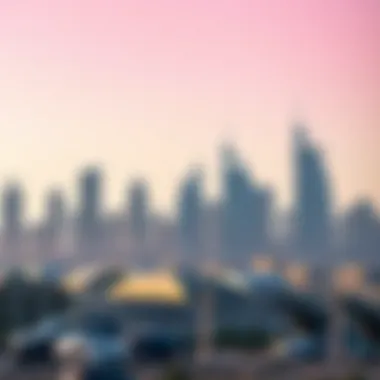
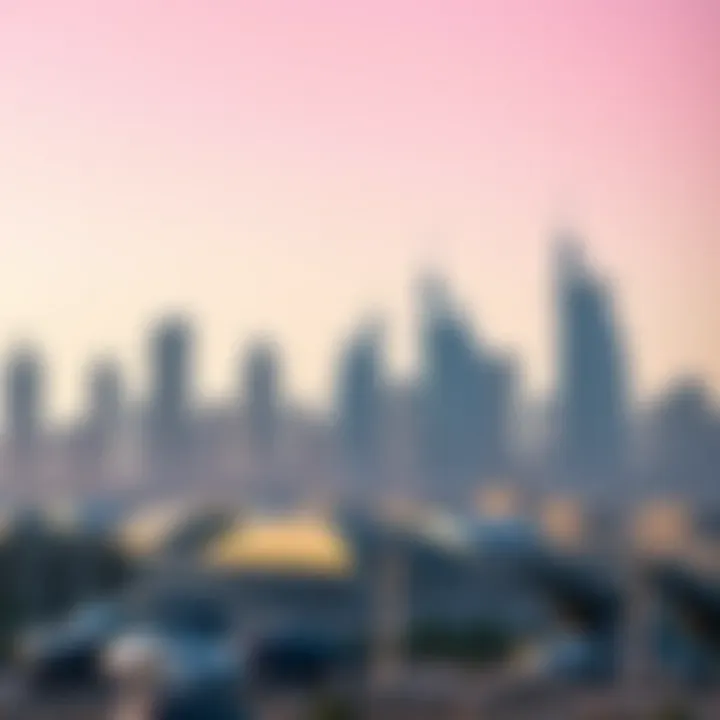
In the past few years, the Dubai real estate sector experienced a variety of challenges. One major issue is the fluctuating property prices that can create uncertainty for buyers and investors. When prices rise sharply, many potential buyers find themselves priced out, leading to reduced demand. For instance, the luxury segment saw a sharp increase in prices, yet the middle-class market hesitated to invest, fearing a bubble.
Moreover, the COVID-19 pandemic threw a wrench into the works, with travel restrictions impacting foreign investment significantly. Many global investors pulled back, resulting in decreased sales volumes. Economic fluctuations and regulatory changes can also act as a double-edged sword. Laws that suddenly alter property ownership rights or increase local taxes can put off international investors eager to settle in Dubai.
However, it’s important to recognize these challenges as potential opportunities for those with the foresight to act. Al Habtoor Group has navigated through these trials by focusing on strategic reform and ecosystem engagement, positioning itself as a trusted developer in uncertain times.
Future Opportunities for Expansion
With every cloud, it seems, comes a silver lining. The recent struggles in the Dubai real estate market may serve as a launchpad for Al Habtoor’s future projects. For instance, the focus has been shifting towards developing affordable housing options, something that stands to excite a broader segment of potential buyers. By offering competitive pricing, the group can tap into the burgeoning demand for cost-effective living solutions that don’t compromise quality.
Additionally, sustainability is becoming the name of the game. By embracing green technologies and development practices, Al Habtoor can position itself as a pioneer in eco-friendly construction. Projects that incorporate renewable energy sources or sustainable materials could attract both local and international interest, thereby increasing investment potential.
Moreover, the UAE’s continued emphasis on stimulating economic diversification could warrant expansion beyond traditional real estate development. Engaging in partnerships with tech firms to integrate smart home features could keep Al Habtoor at the forefront of innovation.
"Investors must look beyond the immediate challenges to identify long-term opportunities within the market."
In navigating these complexities, Al Habtoor Group stands out as a key player with the adaptability and foresight to convert current adversities into future possibilities.
Investor Insights
Understanding the dynamics of investment in the Dubai real estate market is crucial, especially when considering the substantial influence of the Al Habtoor Group. Investor Insights means diving deep into strategies, market trends, and the potential risks and opportunities that arise from investing in properties developed by this prominent group. In a rapidly evolving landscape like Dubai, where every action is often echoed in global markets, these insights can provide a roadmap for both seasoned investors and newcomers looking to navigate the complex terrain of real estate.
Investment Strategies in Al Habtoor Developments
When it comes to forging successful investments in Al Habtoor developments, a range of strategies can prove valuable. First, conducting thorough research is key. This involves not only understanding the specifics of the properties—like location, amenities, and unit types—but also comprehending Al Habtoor's legacy in the sector.
Investors should focus on:
- Market Trends: Keeping an eye on the current market conditions. For instance, as of late 2023, there has been a trend in increased demand for luxury living spaces, and Al Habtoor’s projects fit the bill perfectly.
- Timing: Buying during pre-launch phases can lead to significantly higher returns. Often, properties are offered at lower prices before their completion.
- Long-term Vision: Al Habtoor has established reputation means many of their developments are considered strong long-term holds. Investing in properties within this ecosystem can yield annual returns through rentals or appreciate over time.
Additionally, it’s wise to consider rental yields. Research indicates that some properties developed by Al Habtoor, such as the Al Habtoor City, have generated solid yields owing to their prime location and luxury offerings.
Evaluating Risk and Return
In the realm of investment, understanding the balance between risk and return is vital. It goes beyond mere numbers; it involves a keen assessment of both the market and the developer in question. Al Habtoor's projects often come with a degree of prestige that can mitigate some risks typically associated with real estate investment in emerging markets. However, it’s important to remain vigilant regarding potential challenges.
Considerations for assessing risk include:
- Market Fluctuations: Noticeable shifts in the economy can influence property values. For instance, during times of global economic uncertainty, real estate can see dips in value.
- Developer Reputation: The Al Habtoor Group has a long-standing reputation in the region. Evaluating the track record of completed projects can provide insight into reliability and quality.
- Regulatory Environment: Always stay updated on laws governing real estate and foreign investments in Dubai. Changes can have significant impacts on return potentials.
Overall, aligning investor strategies with a strong understanding of risk and return within the unique context of Al Habtoor’s development can empower investors to make more informed decisions.
"Investing isn't just about making money; it’s about creating opportunities and securing a future"
Investors must engage in thoughtful reflection on these insights and embrace the changing tides of the market to optimize their outcomes in the Al Habtoor sphere.
Finale
The discussion around Al Habtoor's influence in the Dubai real estate market wraps up by underscoring the profound impacts and opportunities that have surfaced due to its strategic endeavors. Unlike many others, Al Habtoor represents a unique cocktail of tradition and innovation in urban development. This synthesis is not mere happenstance; it is a well-thought-out essence that resonates throughout their projects, mirroring not only the architectural landscape but also the methodologies in real estate.
Summarizing Impacts on the Real Estate Environment
To encapsulate, Al Habtoor has reshaped the real estate scenario in Dubai through multiple avenues:
- Diversification of Offerings: Al Habtoor's projects range from luxury residences to commercial spaces, catering to a wide array of buyers and investors.
- Enhancing Value: The company’s focus on sustainable practices and cutting-edge design has driven property values upward, making investments more attractive continuously.
- Economic Catalyst: Collaborating with local governments, Al Habtoor has precipitated increased job opportunities and economic activities in its zones of influence.
These attributes collectively contribute to forming a compelling narrative around the stability and appeal of investment in Al Habtoor developments. The real estate landscape in Dubai has not merely experienced incremental changes; it has transitioned, largely propelled by the innovative contributions of this group.
Looking Ahead: The Road Forward
Peering into the future, several focal points become relevant as the market propels forward.
- Sustainability Trends: With global warming and environmental concerns hitting home hard, Al Habtoor can deepen its investment in green building technologies. Integrating more environmentally friendly practices could set benchmarks, positioning the brand as a leader in sustainable developments.
- Technological Integration: The rise of smart homes and digital platforms can reshape how buyers interact with properties. Understanding that customers now demand seamless tech services can open doors for innovation in future projects.
- Emerging Market Dynamics: As Dubai welcomes more expatriates and tourists post-pandemic, tracking demographic shifts will be paramount. Adapting offerings based on market research can herald new eras of growth for Al Habtoor, aligning closely with emerging buyer personas.
The essence of Al Habtoor’s impact lies not just in the physical structures but in the experiences and community they foster, setting a high bar for real estate development in urban landscapes.
As we march into the upcoming years, stakeholders in the real estate market must keep a close eye on how Al Habtoor adjusts its sails against the changing winds. Whether one is an investor eyeing opportunities or a homebuyer searching for a nest, the tale of Al Habtoor presents a rich tapestry woven with possibilities.







